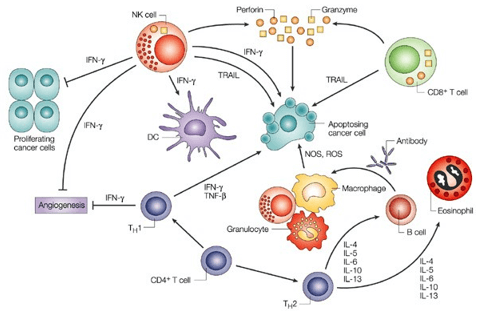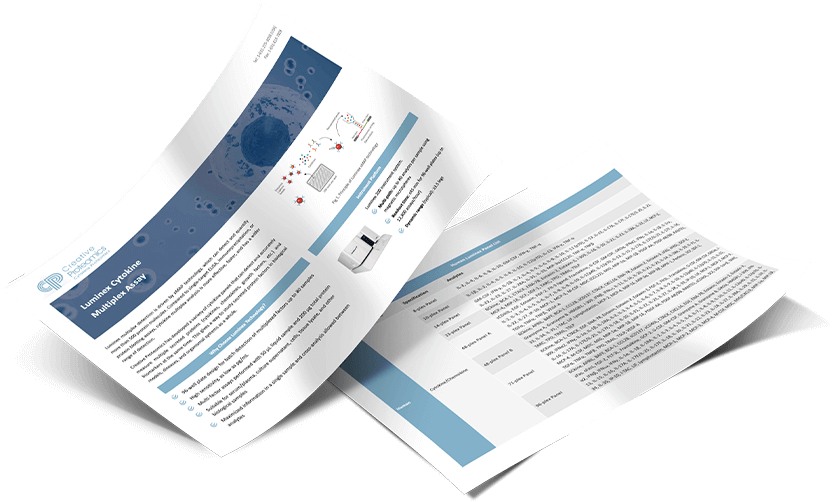Introduction
Creative proteomics can provide highly sensitive qualitative and quantitative analysis of cancer immune-related cytokines, and can detect the levels of multiple cytokines in a single sample.
In the process of tumor formation, cancer cells release various cytokines and growth factors to their surroundings and reprogram many other types of cells to establish a tumor microenvironment. Therefore, tumor tissues almost always contain a large number of endothelial cells, fibroblasts and infiltrating inflammatory cells. Tumors can spread to surrounding tissues through the blood and lymphatic system. A large number of experimental studies have shown that cytokines play an important role in the occurrence and development of tumors.
In order to eradicate these abnormal cells or slow or stop their spread, various therapies have been developed to use the power of the immune system to fight cancer. Start the self-sustaining cycle of cancer immunity, overcome the negative feedback mechanism, and avoid the production of immunosuppressive molecules during cancer.
Creative Proteomics can provide cancer-related factor analysis, accelerate the development of disease mechanism and disease immunotherapy related research.

Cytokines involved in cancer
Tumor cell-derived VEGF acts on endothelial cells to promote angiogenesis and tumor growth, invasion and metastasis. Tumor cell-derived VEGF acts on endothelial cells and promotes angiogenesis and tumor growth, invasion and metastasis. At tumor sites, monocytes differentiate into tumor-associated macrophages capable of producing growth factors, proteases, angiogenic mediators, cytokines, and chemokines such as CCL2 (MCP-1), CCL5 (RANTES). Interleukin (IL-2), IL-6, IL-10, IL-12, interferon (IFN), tumor necrosis factor (TNF), transforming growth factor (TGF) play an important role in promoting tumor progression and anti-tumor. Chemokines such as CXCL10 (IP-10) and CXCL9 may inhibit the development of cancer. In addition, there are many adhesion molecules, such as ICAM-1, ICAM-3, VCAM-1 and selectins, which are expressed by many different types of tumor cells, and are often key factors for metastatic malignant tumors.
Detectable cytokines include but are not limited to:
| EGF | HGF | NGF | OPN | PDGF-BB |
| sAPO-1/Fas | sCD30 | sCD40L | sCD44var (v6) | sE-selectin |
| sICAM-1 | sICAM-3 | sL-selectin | sP-selectin | Calcitonin |
| sCD30 | sCD40L | sCD44var (v6) | RANKL | RANTES |
| IL-1α | IL-1β | IL2 | IL4 | IL-6 |
| IL-8 | IL-10 | IL-12 | IL-17 | IL-18 |
| IL-17A | IL-17A/F | IL-17F | IL-23 | IFN-γ |
| MCP-1 | MIG | MIP-1α | MIP-1β | MMP-9 |
| MMP-13 | TGF-β1 | TIMP-1 |
Technology platform
We mainly provide the Luminex cytokine detection platform. Luminex uses fluorescently encoded microspheres with specific antibodies to different target molecules. The different microspheres can be combined freely to a certain extent so that up to 100 analytes can be tested multiple times simultaneously in a single experiment.
The Luminex cytokine assay platform has the following advantages:
- Multiple detection: simultaneous detection of 100 biological targets
- Short experiment time: 1-3 weeks
- High sensitivity: the lower limit of accurate quantification is as low as 0.1 pg/mL
- Save samples: only need a sample volume as low as 25 μL
- Time saving: the experiment process only takes 4 hours
For your different needs, we can also provide the following detection methods:
- Flow cytometry (FACS analysis): Identify and measure cell biomarkers in complex subpopulations. It can be used for intracellular cytokine detection without two hours.
- Enzyme-linked immunosorbent assay (ELISA): Use the primary antibody for capture, and conjugate the secondary antibody with an enzyme or radioisotope for detection. Our multiplexing system can detect the expression of multiple cytokines at once.
Sample preparation
- Suitable for serum, plasma, cell culture supernatant and all kinds of body fluids.
- Cells (whole blood cells, PBMC, mouse immune cells)
- The body fluid samples are stored in a refrigerator at -80 degrees Celsius and transported on dry ice.
Creative Proteomics can provide you with a one-stop solution. If you want to test other cytokines or other information you want to consult, please contact us. We are looking forward to cooperating with you.
Reference:
- Dranoff G. Cytokines in cancer pathogenesis and cancer therapy. Nature Reviews Cancer, 2004, 4(1): 11-22.

